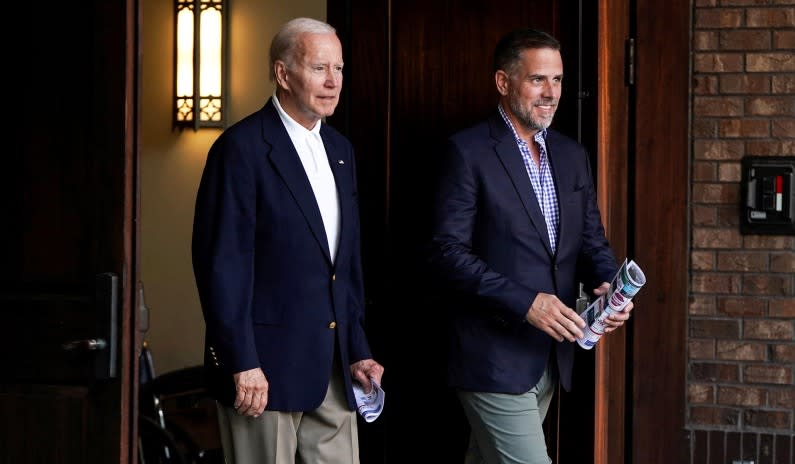Judge Blocks Biden Admin’s Attempt to Shield FBI Official from Deposition on Social-Media Censorship

- Oops!Something went wrong.Please try again later.
An FBI official will be deposed in a lawsuit over alleged collusion between the Biden administration and social-media companies to censor speech on topics ranging from Hunter Biden’s laptop to Covid-19, a judge ruled Monday.
The ruling comes in response to a lawsuit by Missouri attorney general Eric Schmitt and Louisiana attorney general Jeff Landry accusing the federal government of working “hand-in-hand with social media companies to censor freedom of speech on their platforms.” The lawsuit has grown to include 67 defendants, including top officials at the Centers for Disease Control (CDC), the Federal Bureau of Investigation (FBI), the White House, and others.
Last month, the U.S. District Court for the Western District of Louisiana granted the two states’ request for depositions from several top-ranking governmental officials, including Dr. Anthony Fauci, former White House press secretary Jen Psaki, director of White House digital strategy Rob Flaherty, surgeon general Vivek Murthy, Cybersecurity and Infrastructure Security Agency director Jen Easterly, and FBI supervisory special agent Elvis Chan.
Lawyers for the Biden administration sought to block several of the depositions, including Chan’s. The lawyers noted that Meta, Facebook’s parent company, has said that Chan, an assistant special agent in charge (ASAC), did not advise the company to censor the Hunter Biden laptop story.
“Based on this newly received evidence, the Court should amend the Deposition Order, and withdraw its authorization of a deposition of ASAC Chan,” the lawyers argued.
However, the two attorneys general opposed the motion, arguing they never suggested Chan told Facebook to suppress the story but that the special agent participated in talks that led to the suppression.
“Moreover, there are additional compelling reasons to depose Chan—including that he is the principal point of contact between social-media platforms and the FBI Section that combats so-called ‘disinformation’ on social media; that he routinely organizes and participates in oral meetings with social-media platforms about election-related disinformation; and that he has openly boasted about coordinating with social-media platforms to combat misinformation and disinformation,” they said.
U.S. District Judge Terry Doughty rejected the federal government’s motion to block the deposition.
🚨BREAKING: In our lawsuit against the Biden Administration for colluding with social media companies to censor speech, the deposition of an FBI official will move forward after our big win in Court earlier today. pic.twitter.com/G7GrshpUb7
— Eric Schmitt (@Eric_Schmitt) November 14, 2022
“If Chan played no role in the suppression of the Hunter Biden laptop story, then such information will be made clear in his deposition,” Doughty wrote.
“Chan had authority over cybersecurity issues for the FBI in the San Francisco, California region, which includes the headquarters of major social-media platforms and played a critical role for the FBI in coordinating with social-media platforms related to censorship. Even if Chan played no role in the Hunter Biden laptop communication issue, he may have knowledge of who did, and his deposition is nonetheless warranted,” the judge added.
When the New York Post first reported on some of the contents of the laptops in October 2020, Big Tech platforms including Facebook and Twitter censored the story and dismissed it as potential foreign disinformation. The New York Times has since authenticated key files from the laptop, as has the Washington Post.
Doughty added that plaintiffs established that Chan “has personal knowledge about the issue concerning censorship across social media as it related to COVID-19 and ancillary issues of COVID-19” and that he was “identified as the FBI Agent who communicated with Facebook to suppress a story about the Hunter Biden laptop.”
In the original complaint, Schmitt and Landry claim federal officials participated in a pressure campaign against social-media platforms to “increase censorship of views that diverge from the government’s.”
“CISA Director Jen Easterly, for example, texted with Matthew Masterson about ‘trying to get us in a place where Fed can work with platforms to better understand the mis/dis trends so relevant agencies can try to prebunk/debunk as useful,’ and complained about the Government’s need to overcome the social-media platforms’ ‘hesitation’ to working with the government: ‘Platforms have got to get more comfortable with gov’t. It’s really interesting how hesitant they remain,’” the complaint reads.
The complaint adds that a “veritable army of federal bureaucrats are involved in censorship activities ‘across the federal enterprise,'” adding that CISA Director Easterly and Matthew Masterson “complained in text messages that ‘chaos’ would result if all federal officials were ‘independently’ contacting social-media platforms about so-called misinformation. . . . On information and belief, as alleged above, the ‘Disinformation Governance Board’ was created to impose a bureaucratic structure on the enormous censorship activities already occurring involving dozens of federal officials and many federal agencies.”

